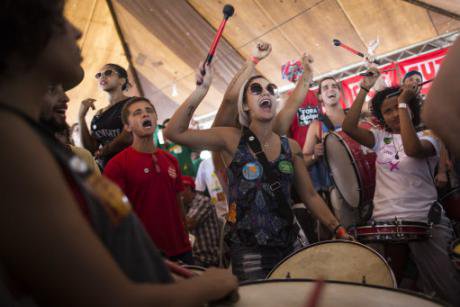
People chant to drums during a rally by Social Movements for Democracy at a camp set up by supporters of President Dilma Rousseff in Brasilia, Brazil. Saturday, April 16, 2016. AP Photo/Felipe Dana.
There is no doubt that the dynamics of society are changing in the 21st century. New ways of producing, consuming, communicating and relating are being added to the known, traditional forms. New ways of thinking about distribution and access. And new ways of thinking about intermediation and participation.
Worldwide, this shows in growing dissatisfaction with the political process and the limits of democracy as we know it. The characteristics of democracy in Latin America are linked to its historical formation and generate limits of its own to the participation demands of a dynamic 21st century society in transformation.
We know that democracy in the region is far from being consolidated. Not because there is a threat of military coups or openly autocratic regimes, but because of the weakening of institutions, the threats to fundamental rights, a curtailment of liberties, and the kidnapping of power by the economic and political elites, and by organized crime.
In this context, emerging political experimentations – in citizen participation, transparency, social control, independent media, 2.0 government, and political culture – arise in different circumstances, in different ways and with different objectives, and are beginning to define a recognizable ecosystem where new possibilities and political dynamics for the 21st century can be identified.
This is being called political innovation or civic innovation ecosystem. But we should be careful to talk about innovation, for the term can generate misperceptions. When talking about a political innovation ecosystem, we need to see the results of its immediate and tangible impact. What we are witnessing in Latin America, though, is an extensive series of experiments that still fail to overcome the political crises and update democracy for the 21st century. Experimentation is a condition for innovation.
A series of articles to understand the scope and impact of political experimentation in the region
We need to observe more closely the emerging experiments in Latin America, in order to be able to understand their scope and impact, their challenges and potential, and to improve the diagnosis on the latent (or emerging) state of a more in-depth democracy in Latin America .
To this end, an alliance between UPDATE (a Brazilian project aiming to understand these emerging practices of political participation in Latin America) and DemocraciaAbierta has commissioned a series of articles we have entitled "Democracy and experiments in Latin America", inviting key actors of these experiments, funders, experts and people interested in the subject to share insights and deepen the discussion on the subject.
Our goal is, on the one hand, to describe in more detail the emerging political experiments and, on the other, to establish a link between their practice and a deeper discussion about the context of democracy in Latin America.
The questions that the series seeks to answer lie in three main areas of debate. First, we shall look for more elements defining the emerging ecosystem of political practices. Second, we shall try to identify the specificity of a Latin American vision, and the constraints and opportunities at the regional level. And third, we shall observe the interaction of these experiments with the current democratic institutions.
In these three areas, a number of questions and issues are to be addressed: What does this emerging ecosystem of political practices consist of, and what are the challenges to be faced and the priorities to be set, in order to strengthen it? How to move forward to recognition of this ecosystem by its members and the different actors in the political arena and civil society?
It will be useful to identify and describe instances which can showcase the field, and answer key questions such as the role of technology in politics, and that of culture and the new languages. We shall also examine the ways of measuring the impact of initiatives, their funding channels, the difficulties they face to ensure their sustainability, and the role of funders.
On the other hand, we need to include a Latin American vision. It is this sense we shall address the question of what are the common elements of democracies in the region. An important aspect will be to examine the transition from a local context to a regional vision, what flows are generated, and how much influence these practices have on the inheritance of the political formation of the region: oligarchic structures, inequality, cultural diversity, political traditions.
Finally, to round off our review of political experimentation in the region, it will be important to examine how and to what extent these practices interact with the traditional political actors (unions, NGOs). Knowing how the established powers relate to the emerging practices will help us to complete the picture and have a better view of the actual and potential impact of these experiments and possible innovations in the political development of each country, and in the region as a whole.
Something is happening in the field of politics in Latin America. While we see the structural problems the political system is showing, the observation of this emerging ecosystem, this laboratory of political experiments, allows us to imagine a next step forward for democracy in the region.
Read more
Get our weekly email
Comments
We encourage anyone to comment, please consult the oD commenting guidelines if you have any questions.